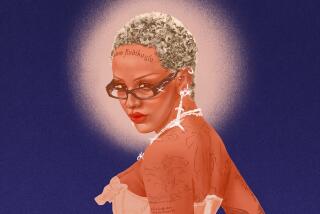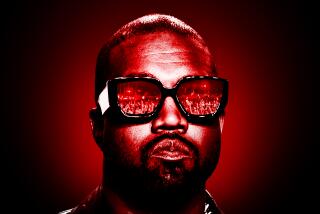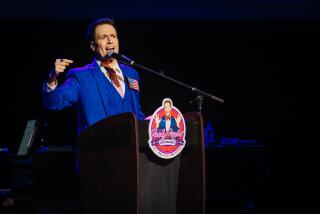Get hip; this is life, y’all
Echo Park resident Joseph Lee doesn’t necessarily look like the leader of a musical movement. Blanketed in thug-like tattoos, a menacing goatee and often photographed in bandanna and Tupac Shakur tee, Lee could easily pass for a long-lost member of Cypress Hill. Yet under the sobriquet Deadlee, Lee is arguably Los Angeles’ most prominent gay rapper, having helped organized the first national “homo-hop tour.”
In spite of frequent censure from the greater hip-hop community, a vibrant gay hip-hop subculture has evolved -- both locally and nationally -- with the clear-cut goals of defying bigotry and realizing self-expression. Los Angeles has emerged as one of the community’s central hubs, a development culminating with this weekend’s Street Cred 101, to be held at Santa Monica’s Highways Performance Space & Gallery.
The event bills itself as an “attempt to debunk the notion that a gay rapper can’t achieve mainstream success.”
Deadlee has been rapping since 2000, when he began recording his debut, “Deadlee Sin,” an effort that initially featured braggadocio about bedding women and partying.
“It was fake,” the Denver-raised rapper said. “My producer reminded me that hip-hop was about telling your story and your truths. So I spoke about all sorts of stuff, suicidal thoughts, coming out; it was just my story.”
With his 2004 sophomore effort, “Assault With a Deadlee Weapon,” Deadlee began to develop significant cult buzz, sparking a 15-city tour that earned notice from leading hip-hop website Allhiphop.com -- along with a barrage of vitriolic comments from readers.
Anybody listening?
Hip-hop has long been a caldron for bigoted sentiment. Just a week before election day, Detroit rapper Trick Trick delivered an expletive-laden anti-gay diatribe that won him more press attention than he’s ever earned from actual rhyming. Yet few within the genre batted an eyelash, as major artists, including Busta Rhymes, DMX, 50 Cent and Eminem, have all delivered scathing anti-homosexual diatribes at various junctures in their careers, none of them suffering any loss of popularity.
Even Kanye West’s mere 2006 plea for greater gay tolerance elicited significant scorn and jeers from his peers.
“Homophobia is ingrained in the African American community because of the church’s teachings,” said Khalil Amani, who bills himself as a spiritual advisor to gay hip-hop. “But voices like Kanye epitomize the new generation, who aren’t as concerned about macho posturing. He’s a bridge between old and new. How many other rap artists are willing to stop their concert at Madison Square Garden and tell their fans to stop being homophobic?”
At least a few, as it turns out. One of the people who discovered Deadlee was Brian Bayer, a 28-year-old Cleveland native who had rapped in 4XWasted, a group that had opened for Bone Thugs-N-Harmony and Insane Clown Posse. Closeted until approximately 2 1/2 years ago, Bayer believed that his decision to come out would kill any chance he had of a career in rap -- until he discovered the gay hip-hop community.
“It was liberating. I could finally rap about things that were truly relevant to me,” said Bayer, who now raps under the name Captain Magik. “One of the best things about it is that people e-mail me to tell me how much they can relate to my music and how it inspires them. When I was doing straight hip-hop, I never got any of those comments. Gay hip-hop has been a blessing for me.”
His homo-hop debut, “Young, Gay & Proud,” unflinchingly addressed topics including gay marriage, drug addiction and his struggles to come to grips with his sexuality. The album’s single, “Dilemma,” a poignant coming-out anthem, was named 2008’s top video from the “Click Best” program on the MTV-owned Logo network.
One of the subgenre’s most outspoken supporters and the author of “Hip-Hop Homophobes,” Amani maintains that it’s only a matter of time before a gay rapper enjoys a major commercial breakthrough.
“Homophobia is strong, but a gay rapper will cross over; it’s going take the right person at the right time to be a Jackie Robinson,” Amani said. “It’s definitely growing. I personally know at least 130 gay, bisexual or transgendered rappers, whereas only a handful existed even 10 years ago. It will happen, and when it does, a lot of people will be mad and a lot will be excited.”
Grant Hayes, who records under the name Last Offence, just might be that crossover artist. Hayes assumed that a career as a rap artist was off-limits to him because of his sexuality and moved to Los Angeles to work in the film industry, spending six years toiling at various management and movie companies. But after attending 2007’s HomoRevolution Tour featuring Deadlee and Captain Magik, Hayes was inspired to start rapping again and was soon being touted by his peers as the best pure rhymer in gay hip-hop.
While flattered at the praise, Hayes believes that if a gay rapper were to transcend such barriers, his or her success would be predicated on having an undeniable, original talent.
“As far as us and what we want to do, if we’re going to be recognized by the general public, we have to offer them something they’re not getting from regular rap,” Hayes said. “We can’t do it just like T.I. or Lil Wayne. We have to offer a fresh sound and new ideas.”
More to Read
The biggest entertainment stories
Get our big stories about Hollywood, film, television, music, arts, culture and more right in your inbox as soon as they publish.
You may occasionally receive promotional content from the Los Angeles Times.






